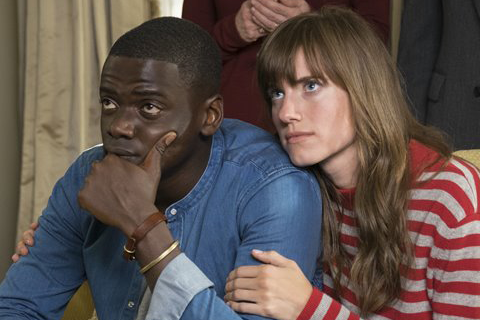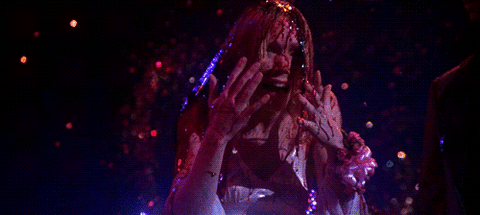Do You Like Scary Movies?
thinx archive
·5 min read

by Mia Abrahams | 03/07/2017
Actual footage of me on work conference calls today
If your answer to that question isn’t “uh-huh”, but: “Scary movies? You mean that schlocky trash that my fourteen-year-old brother and his friends used to watch while I was trying to study?” then we have some work to do!
I get that the idea of watching a movie through your fingers and then sleeping with the lights on doesn’t really appeal to everyone. And yes, some movies are made solely to make you jump, squirm, and throw your popcorn at the TV (Saw, Paranormal Activity, every movie starring a bunch of good-looking B-list actors in a cabin in the woods).
But, horror movies are much more than that. They have long been a way for people to discuss, examine, and subvert societal taboos and norms — things that are usually swept under the rug, along with that trapdoor that may or may not lead to a cellar where an evil spirit lives. (And you know how much we appreciate a good taboo-smash here at THINX).
Cue eerie orchestral music and enter Jordan Peele’s (yes, of sketch show Key and Peele) directorial debut, Get Out. In case you haven’t been on Twitter, people are losing their *minds* over this movie. On its opening weekend, it was 100% certified fresh on Rotten Tomatoes, it made $30.5 million (its original budget was $4.5 million), and Chance the Rapper even bought out an entire cinema worth of sessions in his hometown of Chicago so anyone could go see the movie for free.
So why is this horror movie blowing people’s minds? Just like Buffy the Vampire Slayer flipped gender stereotypes in the opening minutes of its first episode (a creepy guy leads a frightened blonde girl down an empty high school corridor, presumably to do something unsavory, until she turns into a vampire and bites him in the neck), Get Out immediately lets the audience know this isn’t going to be your ordinary screamfest. The movie opens on black man walking down a street in a quiet, affluent (read: white), neighborhood, freaking out on the phone to his friend: “I stick out like a sore thumb”. He’s right to be worried.
I won’t say tooooo much because of #spoilers, but srlsy, if you haven’t seen the movie, your SPOILER ALERT window is quickly shutting. Basically, Get Out stars Daniel Kaluuya as Chris, a black photographer who goes to meet the parents of his white girlfriend Rose (Allison Williams of Girls) at their super fancy country home. Rose’s parents are immediately familiar as the liberal, intellectual, hippy-ish parents, that “would have voted for Obama for a third term, If they could!” But something feels a little. . . off.
Longtime horror fan Jordan Peele made Get Out because he wanted to make his “favorite movie that doesn’t exist”, aka, a horror movie with a black man as the hero, not just the fourth character to get picked off by a serial killer on the loose (just after the promiscuous college girl, her jock boyfriend, and the rebellious loner with a secret).
Get Out is part of a long tradition of horror films that tackle big issues. One thing that horror movies have been particularly good at is addressing patriarchal pressures and societal expectations placed on women. Who can forget the infamous bathroom scene in the movie Carrie where a group of mean girls torture Carrie by throwing tampons and pads at her after she gets her period? Well, Carrie later gets her revenge, when she embraces her own powers after getting (pretty symbolically) covered in blood, and burns the patriarchy (aka her high school) to the f*ckig ground. More recently, It Follows (srsly, if you are a horror fan and haven’t seen this movie, you *need to* asap) addresses young women’s sexuality and perceived promiscuity in a totally original and REALLY creepy way.

TFW it's day 3 of your period & u forget to wear your THINX
Get Out tackles racism head on: from the subtle racism that exists for a lot of people on a day-to-day basis, to extreme racism and everything in between. The film forces the audience to step inside Chris’s shoes, and confront the insidious racism (particularly of liberal white intellectuals who might think themselves past issues of race) in those everyday conversations that make it clear who belongs and who doesn’t. For Peele, “the monster of racism lurks underneath that conversation”.
And yeah, fine, it’s also scary as hell.
As Taylor Antriam puts it in Vogue, “Do we need a horror movie to explain America to ourselves right now? Get Out’s answer is a provocative yes.”
Just remember to sleep with the lights on.

by Mia Abrahams


